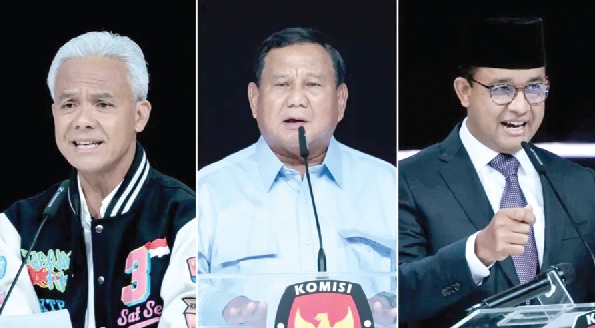
The world’s largest single-day election held in Indonesia
More than 200 million out of Indonesia's 270 million population went to the polls last Wednesday to cast their votes to elect a new president in what is billed as the world’s biggest single-day election.
Advertisement
The vast country of Indonesia is poised to transition into a new political era following President Joko Widodo's completion of his maximum presidential term. In this significant event, Indonesians will not only choose a new president and his vice but will also elect parliamentary and local representatives.
The sprawling Southeast Asian nation, the world’s third-largest electoral democracy and largest Muslim-majority country, has made impressive gains since the fall of the late dictator Suharto’s authoritarian regime in 1998 and morphing into one of Asia’s most vibrant democracies and economies.
World’s largest nation
Hosting a vote in the world’s largest archipelagic nation is a huge effort. The country is wider than the United States and straddles three time zones. It is made up of over 18,000 islands and islets of which 6,000 are inhabited, and over 150 languages spoken across its breadth.
With more than 210 million Internet users, Indonesia boasts one of the world’s largest digital populations. The Internet plays a huge role in the country’s politics with 60 per cent of voters under 40 using social media as their primary source of information, according to a 2022 survey, followed by television at 40 per cent.
Voting isn't mandatory but election day is declared a public holiday, ensuring a typically high turnout. According to Indonesia's General Election Commission, the voter turnout in the previous election in 2019 stood at 81 per cent.In the current year, 49.91 per cent of registered voters are male, while 50.09 per cent are female.
Presidential candidates must secure 50 per cent of the total votes and a minimum of 20 per cent of votes in each province to win.
There are 18 national political parties across Indonesia, competing for presidency as well as 575 parliamentary seats. With incumbent President Joko Widodo, commonly referred to as 'Jokowi', having served the maximum two terms, the upcoming election signifies the first change in leadership in a decade.
Overseeing the process at polling stations will be approximately seven million election officials and independent workers. A preliminary outcome from the elections commission is expected to be declared on the evening of February 14th, but the official result might require up to 35 days, especially if the margin of votes is narrow.
The campaign has been dominated by big personalities in a decisive election that will also select some 20,000 other national and provincial lawmakers. Younger Indonesians are key, with around half of registered voters being under the age of 40, according to the General Election Commission.
A presidential candidate needs a simple majority of at least 50 per cent of total votes and 20 per cent of votes in more than half of the country’s 38 provinces to win. If no one succeeds, a run-off will take place on June 26.
Presidential candidates
Although there exist 18 national political parties across Indonesia, the race is between a former army general and two former governors. Prabowo Subianto, 72, a former military general and incumbent defence minister, is running for president for a third time, and he’s currently leading the polls.
Prabowo is the former son-in-law of the late dictator Suharto and his controversial background hasn’t dented his popularity, as experts warn dynastic politics is making a comeback.
Another main contender is Ganjar Pranowo, the candidate of the ruling Indonesian Democratic Party of Struggle. He served two terms as governor of Central Java which has won him a large following outside the capital Jakarta in Indonesia’s most populous island. His running mate is senior minister Mahfud MD.
Former Jakarta Governor, Anies Baswedan, is the third main contender running as an independent candidate and has strong links with Islamic political groups, and his Vice-presidential pick, Muhaimin Iskandar, is the leader of Indonesia’s largest Muslim political party, the National Awakening Party. Anies was the former governor of Jakarta, a position he won in 2017.
Outgoing President
Outgoing President Joko Widodo, popularly known as Jokowi, has dominated Indonesian politics since 2014 but is constitutionally barred from seeking a consecutive third term.
He was hailed at the time as a break from Indonesia’s dynastic politics. But concerns have been growing over what many view as moves by Jokowi to secure influence after leaving office through his 36-year-old son Gibran Rakabuming Raka, who is running for vice president with Prabowo.
Gibran was made eligible to run despite being below the age limit after a constitutional court ruling – headed by Jokowi’s brother-in-law – granted him an exception.
“The plan is clearly to establish a Jokowi dynasty and Gibran fits the mould,” said Adrian Vickers, professor of Southeast Asian studies at the University of Sydney. “He is also clearly the asset for Prabowo in getting the millennial vote.”
Indonesia is a youthful nation. At least a third of voters are millennials, and 22 per cent are Gen Z. But nearly one in five Indonesians aged between 15 and 24 are unable to find work, based on government data.
The young electorate has emphasised job opportunities, eradicating poverty and corruption as their top three priorities in the vote, according to a survey conducted in November 2023 by Lembaga Survei Indonesia and the ISEAS – Yusof Ishak Institute.
Election victory
Indonesian Defence Minister, Prabowo Subianto has a strong lead in the race for the presidency of Southeast Asia's biggest economy, preliminary results collated by government-approved pollsters showed Wednesday after polls closed.
According to them with around 60 percent of sample votes tallied in so-called "quick counts" that have previously proven reliable, two independent pollsters showed Subianto on more than 55 percent of the vote, which would be enough to avoid a second-round run-off. however Officials results are expected next month.




